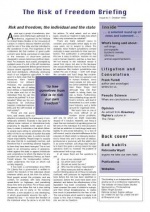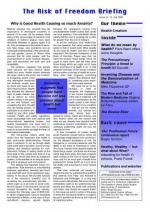Risk of Freedom Briefing


The Risk of Freedom Briefing was a publication edited by conservative activist Roger Scruton between October 1999 and July 2007[1] and funded by Japan Tobacco International.[2] The briefing was created after a conference The Risk of Freedom conference, held in London in 1998 and funded by tobacco firm RJ Reynolds. According to Scruton:
- My wife and I have a company devoted to public affairs, the aim of which is to help clients to find the language appropriate to their concerns and to promote debate of those concerns in the media. Japan Tobacco International has been our client for the last three years. We have advised JTI on language and arguments and arranged debates, seminars and conferences on risk and freedom, with their declared sponsorship.
- We have also published Risk of Freedom Briefing, circulated to journalists (including some on the Guardian) the purpose of which is to stimulate debate. This carries my name as editor and JTI's name as sponsor. We have never concealed the relationship, but have tried to make clear we are related to our client not as advocates but as advisers. [2]
It seems that contributors to the briefing were paid for their articles. According to a comment by John Adams[3], an article written which he wrote for but was not published in the Briefing was 'paid for by the tobacco industry'. 'Sadly', he noted 'before it could be published, JT International withdrew their sponsorship and the publication ceased business... But although it wasn’t published I was paid for the article so I confess to have taken the industry’s shilling – or in this case £100.'[3]
Lanesborough Luncheons
The briefing published extracts from the speeches given at successive Lanesborough Lunches an informal dining club also funded by Japan Tobacco International.[4] The first Lanesborough Lunch (20/5/99) was addressed by Frank Furedi of the LM network.[5] The lunches were cited by lobbyists Edouard Peter and Michael McKay of Advisio International as an example of a 'platform and follow-through series' which can help in 'conditioning public debate'.[6] The strategy recommended is
- First, elevate the issue as high up the scale of logic, objectivity and social relevance as possible: It is not about this or that product, it is the boundaries to freedom of commerce... For example, practically all products may have negative health consequences, yet there is the broader issue of personal choice that needs to be balanced with an inclination to regulate. The freedom for adults to make their good or bad choices attracts influential audiences who otherwise may have no particular interest in the particular products.
- Second, have a prestigious and credible third party assume the public debate on your behalf. The corporation doesn’t hide, yet its spokespersons never take the front of the stage in the public debate. Wherever possible, the third party is an independent institution, a recognized platform for objective debate among experts.
- Bringing these two conditions together requires enormous tact, long-standing networks of relations at the highest levels and the ability to behave in a neutral fashion as a bridge between academic, political, media and commercial thought processes. The latter often disqualifies large, well-known consultancies. That is why this approach is not applied more often. Or if it is, can’t attract attention to itself and risk self-defeat.[6]
People
Editor: Roger Scruton | Editorial assistant: Sophie Jeffreys,[7] (later Sophie Scruton). Amongst those published in the briefing:
- J.R. Lucas of Merton College, Oxford[8]
- Bill Durodie of the LM network.[9]
- Norman Barry of the University of Buckingham [10]
Resources
- Archive of the briefing: http://web.archive.org/web/20060616140335/riskoffreedom.com/archive.php
- The Risk of Freedom Briefing - Issue no 1, October 1999 'A Selected Round up of News and Comment'
- The Risk of Freedom Briefing - issue no 3 April 2000 'transnational governance'
- The Risk of Freedom Briefing - Issue no 4, July 2000 'The Power of NGOs'
- The Risk of Freedom Briefing - Issue no 6, January 2001 'Transnational Governance'
- The Risk of Freedom Briefing - Issue no 7, April 2001 'Political Correctness'
- The Risk of Freedom Briefing - Issue no 8, July 2001 'The Informal Economy'
- The Risk of Freedom Briefing - Issue no 9, October 2001 'The Defence of Freedom'
- The Risk of Freedom Briefing - Issue no 10, January 2002 'Uncomfortable Truths'
- The Risk of Freedom Briefing - Issue no 11, April 2002 'The Sound of Silence'
- The Risk of Freedom Briefing - Issue no 12, July 2002 'health creation'
- The Risk of Freedom Briefing - Issue no 13, Ocotber 2002 'addiction'
- The Risk of Freedom Briefing - Issue no 14, January 2003 'Branding'
- The Risk of Freedom Briefing - Issue no 15, April 2003 'Advertising'
- The Risk of Freedom Briefing - Issue no 16, July 2003 'denormalization'
- The Risk of Freedom Briefing - Issue no 17, October 2003 'The Private Policeman'
- The Risk of Freedom Briefing - Issue no 18, January 2004 'Litigation Un-Limited'
- The Risk of Freedom Briefing - Issue no 19, April 2004 'Cannabis'
- The Risk of Freedom Briefing - Issue no 20, July 2004 'Human Rights'
- The Risk of Freedom Briefing - Issue no 21, October 2004 'Children'
- The Risk of Freedom Briefing - Issue no 22, January 2005 'Shareholding'
- The Risk of Freedom Briefing - Issue no 23, April 2005 'Alcohol - Drinks and Drunks' (contents page only)
- The Risk of Freedom Briefing - Issue no 24, July 2005 'Lobbying'
- The Risk of Freedom Briefing - Issue no 25, October 2005 'Intelectual Property'
- The Risk of Freedom Briefing - Issue no 27, April 2006 'Humour'
- The Risk of Freedom Briefing - Issue no 28, July 2006 'Diversity'
- The Risk of Freedom Briefing - Issue no 29, October 2006 'Therapy Culture' [12]
- The Risk of Freedom Briefing - Issue no 30, January 2007 'Freedom of Religion'
- The Risk of Freedom Briefing - Issue no 31, April 2007 'Obesity'
- The Risk of Freedom Briefing - Issue no 32, July 2007 'The Theory of Risk'
- John Adams The tobacco industry and me, 2008. An article written for but not published in the Briefing: 'This posting has been paid for by the tobacco industry. It is an article commissioned by Risk of Freedom Briefing, a publication edited by the philosopher Roger Scruton and sponsored by JT International (Japan Tobacco). Sadly, before it could be published, JT International withdrew their sponsorship and the publication ceased business. So it is published here for the first time. But although it wasn’t published I was paid for the article so I confess to have taken the industry’s shilling – or in this case £100.' John Adams also spoke at The Risk of Freedom conference.
Notes
- ↑ See the holdings in the Internet Archive: The Risk of Freedom Briefing Archive, retrieved from the Internet Archive of 22 April 2008
- ↑ 2.0 2.1 Roger Scruton A puff for the Scrutons The Guardian, Monday 28 January 2002 01.33 GMT
- ↑ 3.0 3.1 John Adams The tobacco industry and me, 2008.
- ↑ School of Advanced Study, Annual Report 2000/01 University of London.
- ↑ Frank Furedi 'Litigious Britain: Consolation and the compensation culture' The Risk of Freedom Briefing, Issue No. 1 October 1999, p. 3.
- ↑ 6.0 6.1 Edouard Peter and Michael McKay Proactive Positioning – a Public Affairs approach A White Paper Jedco Conseil, posted 15 August 2005
- ↑ Risk of Freedom Briefing Archive
- ↑ J.R. Lucas ACE: Assess Cost of Error published in The Risk of Freedom Briefing, Issue no.5 October 2000
- ↑ Bill Durodie The precautionary principle is causing a scare Risk of Freedom Briefing, July 2002.
- ↑ Norman Barry Capitalism - the threat from within. Risk of Freedom Briefing 22, January 2005
- ↑ Data compiled from pdf's stored on wayback machine captures listed above. Numbers in parenthesis indicate number of contributions
- ↑ No link found on Internet Archive